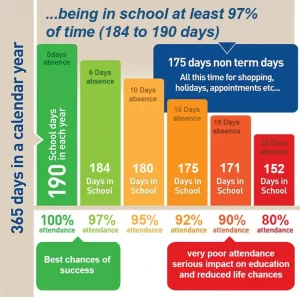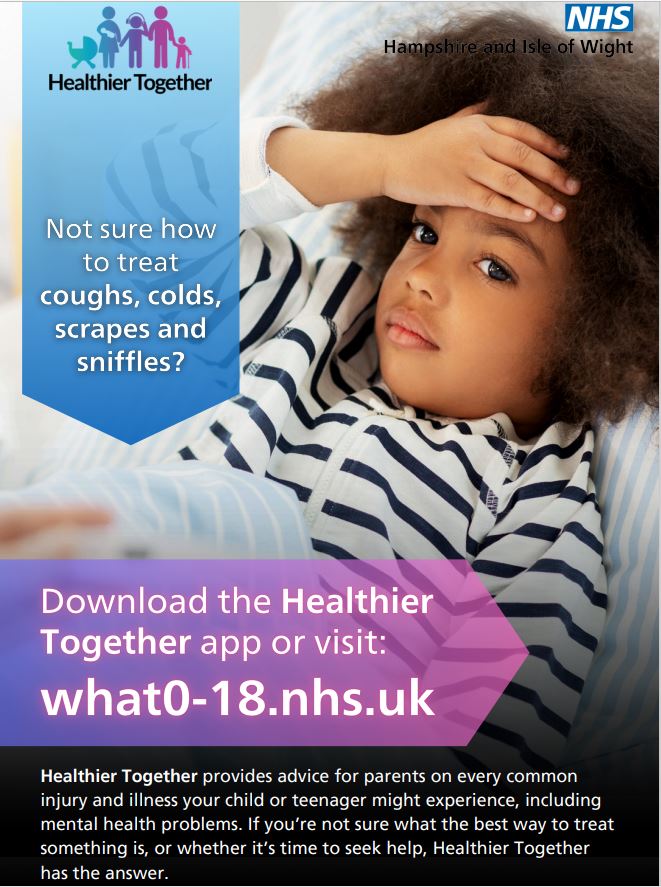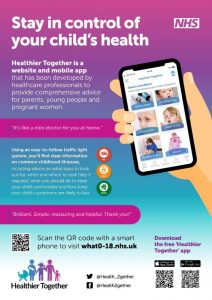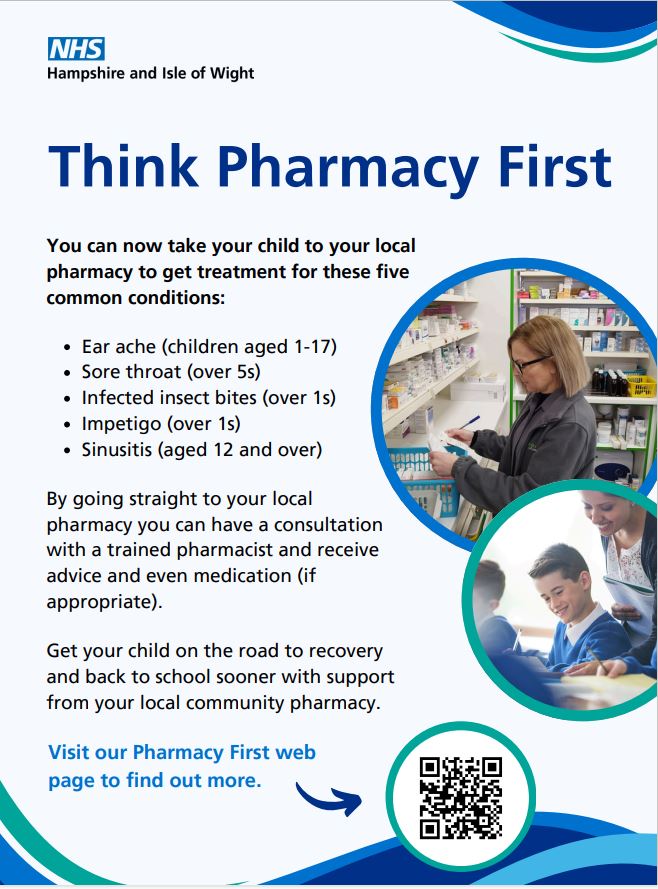If your child is not well enough to attend school, please ensure you let the school know by telephone 01983 740285 or email: office@brighstoneprimary.org.uk by 8.55 am on the first day of absence. On subsequent days of absence, please also inform the school.
When your child is well enough to return to school, please provide a note or email explaining the absence. If we do not receive this within 3 days of your child returning to school, the absence will be marked as UNAUTHORISED.
For more information please see our attendance policy on our policies page, and the information sheet from the DfE.
Attendance Action Alliance Guide for Parents on School Attendance
Scroll down to see helpful advice from the NHS about when to keep your child off school and when they can attend.
Attendance and Punctuality
A good education is vital for children and young people and regular and punctual attendance at school is a key factor in helping children to make good progress, open up more opportunities in adult life and fulfil their potential.
One of the most important ways a parent can support the education of their child and the child’s social, emotional and academic development is to ensure they attend every day and on time and avoid any unauthorised absences.
Ensuring a child’s regular attendance at school is a parent/carer’s legal responsibility and permitting absence from school without a good reason constitutes an offence in law and may result in a penalty notice or prosecution.
Did you know that:
• A child who is absent a day of school per week misses an equivalent of two years of their school life;
• Ten whole days of school has been missed if a pupil has 95% attendance – that’s around 50 lessons;
• Twenty whole days of school has been missed if a pupil’s attendance is 90%;
• If a pupil is persistently absent (90% attendance) they have missed 4 weeks of schooling;
• Being 15 minutes late each day is the same as missing two weeks of school over the year;
• Catching up on missed lessons impacts on the pupil, the teacher and other pupils in that class.
When a child misses the start of the day, they miss learning time and vital information for the day. Children who arrive late disrupt others, therefore not only affecting their own learning but that of others in the class. Lateness can have a detrimental effect on a child’s wellbeing, because it can be embarrassing for the child, which can then lead to further absence due to worries about entering the class once lessons have started. For our records, you will be asked for the reason for your child’s lateness.
We acknowledge that each family’s circumstances are different and we aim to work with parents to provide the best education for every child. We want to make sure that we can support your child’s education in the best way possible, including reducing absence rates.
Letters are sent every term informing you of your child’s attendance percentage and how this compares with our expectations. Separate letters or emails will also be sent to parents where their child’s attendance (including lateness) is of greater concern.
For further information, please see our Attendance Policy on the school website.
If you have any further questions, please do not hesitate to contact Rebecca Lennon (Headteacher and Attendance Lead) or Melissa Jones (Family Liaison Officer).
We thank you for ensuring your child is in school on time every day and we look forward to continuing to work collaboratively with you to further improve attendance and punctuality.
Leave of Absence
As Parents/Carers, you have a legal responsibility to ensure your child’s regular attendance at school. Applications for leave of absence will only be granted in exceptional circumstances as determined by the local authority and the number of days given will be determined by the Headteacher. If you wish to apply for a leave of absence for your child in term time, you will need to complete the form below and return it to the school office. Please note that holidays taken during term time will not be authorised.
Any leave of absence during term time, which is not applied for or agreed to by the school, will be recorded as unauthorised and will be referred to the Local Authority, which may result in a Truancy Penalty Notice (TPN) being issued or Prosecution under Section 444 Education Act for failure to secure regular attendance at school.
Parent Pamphlet – Term-time leave of absence 2024
Application for pupil leave of absence form 2024
First Aid and Administering Medication
If your child has an accident or is taken ill during the school day, we may need to contact a parent/carer. Please do keep the school office informed of any changes to your contact numbers. If your child has a chronic health condition, please inform and discuss this with either Melissa Jones (Family Liaison Officer) or Debbie Pelosi (School Administrator).
We are unable to administer medicines in school unless by prior arrangement. If your child needs medicine during the school day, a medicine administration form must be completed by the parent/guardian and given to the school office before any medication can be administered to the child (see the link below).
Medicines must be in date, correctly labelled, and provided in the original container (except in the case of insulin which may come in a pen or pump) with dosage instructions. Medicines which do not meet these criteria will not be administered.
All medicines must be brought directly to the school office at the beginning of the day and not left in the child’s school bag.
Please note – Unless prescribed by a doctor, the school will not administer medication containing Ibuprofen or throat lozenges and cough sweets.
Medical Information and Advice
The NHS has produced a helpful guide to help parents/carers make an informed decision whether or not to send their child to school when they have a mild illness:
https://www.nhs.uk/live-well/is-my-child-too-ill-for-school/

Diarrhoea and vomiting – advice for parents and carers
Feeling sick and then vomiting is usually the first sign that your child has a ‘tummy bug’. Gastroenteritis is unpleasant and can spread very easily. It’s not always possible to avoid getting gastroenteritis, but following the advice below can help stop it spreading:
– Stay off school or nursery until at least 48 hours after the symptoms have passed. Your child should also avoid visiting anyone in hospital during this time.
– Ensure your child washes their hands frequently and thoroughly with soap and water, particularly after using the toilet and before eating food.
– Disinfect any surfaces or objects that could be contaminated. It’s best to use a bleach-based household cleaner.
– Wash contaminated items of clothing or bedding separately on a hot wash.
– Don’t share towels, flannels, cutlery or utensils while you or your child is ill.
– Flush away any poo or vomit in the toilet or potty and clean the surrounding area.
Should your child become unwell with diarrhoea and/or vomiting, try to avoid going to your GP, as the virus can spread to others very easily. Call NHS 111, your GP or a Pharmacy if you’re concerned or need any advice.
Avoiding dehydration is important – give your baby/child extra fluids. Vomiting tends to last for 1-2 days, and diarrhoea tends to last for about 5 days.
For online advice see www.what0-18.nhs.uk – search ‘diarrhoea and vomiting’.
How long should your child stay away from school if he or she is ill?
Chicken pox – 5 days from the onset of rash
German Measles – 6 days from the onset of rash
Measles – 4 days from onset of rash
Mumps – 5 days from onset of swollen glands
Whooping Cough – 4 days from commencing antibiotic treatment
Gastro-Enteritis – Until well and free of symptoms. Stay away for 48 hours after becoming free of symptoms.
It is important that we are notified in the case of an infectious illness.
Head Lice
If you discover that your child has head lice, please seek medical help from the pharmacist or your GP.
It is also important for you to inform the school office or class teacher if you find your child has head lice so we can reduce the risk of it spreading.





